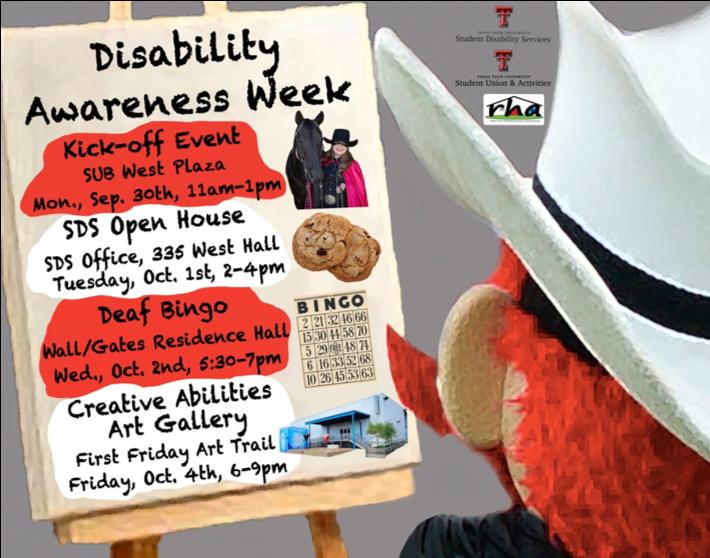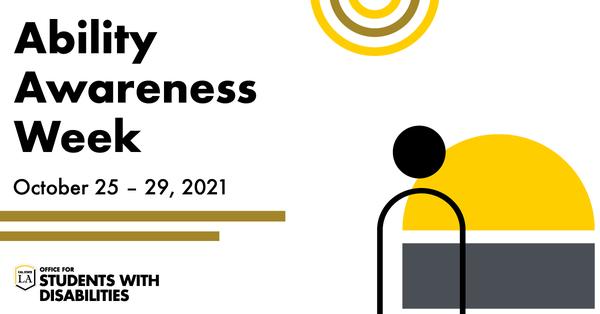
Sophomore Ivan Manriquez, junior Samantha Ortega and senior Alicia Yu visit the Disability Awareness Week table on main campus March 16. Disability Awareness Week lasted March 14-18. Photo by Ashley Mowreader
Pepperdine’s Office of Student Accessibility honored Disability Awareness Week March 14-18 through several events on campus for students to participate in. The goal of the week is for students to start looking at the world through the lens of accessibility, OSA Student Coordinator Emily McNutt said.
The week included activities such as trivia regarding accessibility, film screenings, disability justice yoga and solidarity day — a day that challenges students to only use accessible routes and spaces on campus.
“We have been given a really unique opportunity with our public education to try to advance disability and disability justice in those places,” McNutt said. “I hope that they walk away from this and try to use their power and voice to advance the cause of accessibility and disability justice.”
Overview of the Week
OSA hosted events everyday throughout the week to honor and educate community members about Disability Awareness Week.
Throughout the week, there were accessible options in the Caf to accommodate all dietary needs, as well as opportunities for students to make accessible items through the 3D printers in the library.
“There’s a lot of different things on the list [of items to make on the 3D printer],” McNutt said. “Some of them are bottle openers, button devices that help people push buttons, easier door reach travelers that can open doors from a distance or without certain grip strength, and just a variety of things that could help somebody live day to day life activities.”
OSA also tabled on main campus every day to spread awareness and educate students about disabilities, all while playing music and talking with students walking by.
On March 14, OSA organized and ran trivia for students, incentivizing students to participate through giveaways. The trivia centered around what a disability is, what accessibility is and what the difference between the two are, McNutt said.
OSA hosted a film screening March 15, of the film “Crip Camp,” and offered free t-shirts for the first 50 attendees. After the screening, OSA invited faculty members to speak about the history of disabilities.
“I think it [the film] shows a lot of the really important history of the activism work that was done in order for disabled people to receive increased rights in the United States,” McNutt said. “It really follows a group of people who do just that and do it super effectively when they were talking more about the disability of intersectionality.”
March 16 was a day dedicated to intersectionality — students were able to learn about the intersection of identity and disability. OSA also hosted a free American Sign Language class in the evening for community members to participate in.
OSA encouraged community members to come together for Solidarity Day on March 17.
“Even if you’re a really busy person, I think every single person can participate in this,” McNutt said.
McNutt said this day challenged students and staff to not use any stairs or use any doors that did not provide accessibility buttons.

“The idea behind this is just to put yourself in the position and the shoes of someone who is using those routes on a daily basis,” McNutt said.“And to see how easy or hard it is and assess where we are at as a campus.”
OSA ended the week by hosting a yoga session on Alumni Park, only practicing accessible movement.
“We are focusing a little bit more on how accessibility really, truly is for everyone,” McNutt said, in reference to the yoga event.
Senior Melinda Colbert tabled for Disability Awareness Week every day, and said she was happy to see students stopping and interacting with the table and learning more about accessibility.
“It’s still been nice seeing the change in the environment and how it’s being viewed by the other students here,” Colbert said.
Colbert said she planned to participate in Solidarity Day by walking her normal routes, but recording herself and then sharing the recording with others to spread awareness of how many unaccessible routes she uses.
“We talk a lot about some of the more extreme ends of the physical disability spectrum,” Colbert said. “That’s valid and it’s something that really does need to be addressed. But there’s a lot of students on campus who have invisible disabilities too and it’s really hard to figure out how to navigate it.”
Goals for Disability Awareness Week
McNutt said OSA hoped to spread awareness about accessibility through this week, and show students that accessibility affects everyone whether they realize it or not.
“Anyone can become disabled at any time for any length of time,” McNutt said. “You may feel that you’re able bodied right now, but tomorrow, you could break your leg or develop an illness.”
One in four adults in the United States live with a disability, according to the Centers for Disease Control and Protection. Disabilities can be chronic illnesses, mental illnesses or physical illnesses. Globally, an estimated one billion people have a disability, according to the CDC.
“Something that we need to hold true to as a community, as a campus, is that nothing that we build, nothing that we do, should happen without the inclusion of disabled voices,” McNutt said.
McNutt said she would like to see an increase in the value of disabled voices on campus, and make campus a place where students know they can find accessibility options and feel loved, despite their disabilities.
“There are probably students who never come to our campus because they don’t feel like their needs will be met here,” McNutt said. “So how do we strategically and creatively think of ways to make sure that those voices are included also, so that more and more students can come to our campus, and more and more people can feel welcome and valued here.”
While participating in the week, Colbert said she hoped students learned practical ways to carry on the movement and continue to spread the importance of accessibility on campus.
“Even just this amount of change has been really nice to see,” Colbert said. “I would love in the coming years to see forward momentum and things continue to change to make this campus more welcoming and accessible.”
–––––––––––––––––––––
Follow the Graphic on Twitter: @PeppGraphic
Contact Abby Wilt via Twitter (@abby_wilt) or by email: abby.wilt@pepperdine.edu